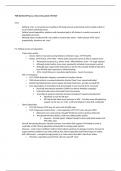TWE did the NP face a crisis in the period 1974-83?
Intro:
- Defining ‘crisis’ as circumstances resulting in NP being severely undermined and (crucially) unable to
act to resolve underlying issues
- Political unrest/opposition, problems with homeland policy, NP division & scandal, economic &
population pressures
- Although factors weakened NP, not unable to resolve/take action – Botha elected 1978, acted
pragmatically, therefore not ‘crisis’
P1: Political unrest and opposition
- Trade union activity
o Unions: SACTU, Food and Canning Workers in Western Cape, 1979 FOSATU
o Strikes: 1972 PUTCO, 1979 Fattis + Monis strike (Coloured women & African migrant men)
Threatened economy (e.g. Sweet, Food + Allied Workers Union – SA sugar exports)
Although existed earlier, grew more organised & included more groups in period
Although state suppression hindered (e.g. SACTU only reached 50,000 & faltered in
face of1960s state repression), still threatening
1976, 1.6mil Africans in manufacturing/factories – heart of economy
- ANC re-emergence
o 1979 COSAS (Ephrahim Mogale), committed to Freedom Charter
o 1980 school protests vs unequal education (started Cape Town, spread nationally)
o SAAWU (SA Allied Workers Union) openly declared Charterism, secretly recruited MK
o Civic organisations in townships/rural areas fought vs local councils (rent, removals)
Received international attention (1980s Free Nelson Mandela campaign)
Links with trade unions increased threat to economy
Townships & separate education tensions threatened ‘separate development’
Significant as was key NP goal
NP had already taken every measure vs ANC – fact they were still gathering
support can be seen as ‘crisis’ as NP was helpless to stop ANC completely
- Liberal Opposition
o 1974 UP (formed 1959) won 42 seats with 363,000 votes
o 1979, Progressive Federal Party = main opposition (1979 19% vote, 26 seats 1981)
Believed in non racial society, thought NP did too much to protect white jobs
Threatened NP policy/belief, could have shifted public opinion
However… limited impact, Slabbert (leader) contact with black leaders lost
PFP white votes
- Overall, threatening because: harmed economy, hurt whites (NP support), NP limited in action it
could take vs ANC, liberal opposition had potential to change public opinion
- However… trade union insufficient without international sanctions to damage economy, focused on
wages/working conditions not wider political aims, liberal opposition had limited impact in reality,
ANC still banned – emerged through groups (e.g. trade unions) but didn’t take direct action
o Therefore, opposition posed threat, did not cause NP ‘crisis’




